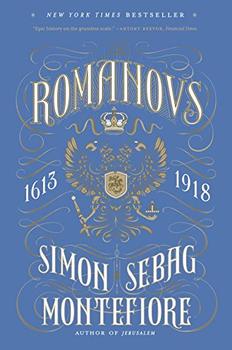Summary | Excerpt | Reviews | Beyond the Book | Readalikes | Genres & Themes | Author Bio

Critics' Opinion:
Readers' Opinion:
First Published:
May 2016, 784 pages
Paperback:
May 2017, 784 pages
 Book Reviewed by:
Book Reviewed by:
Kim Kovacs
Buy This Book
Intelligent tsars understood that there was no division between their public and private lives. Their personal life, played out at court, was inevitably an extension of politics: "Your destiny," wrote the Roman historian Cassius Dio about Augustus, "is to live as in a theatre where your audience is the whole world." Yet even on such a stage, the real decision-making was always shadowy, arcane and moulded by the ruler's intimate caprice (as it is in today's Kremlin). It is impossible to understand Peter the Great without analysing his naked dwarfs and dildo-waving mock-popes as much as his government reforms and foreign policy. However eccentric, the system worked and talent rose to the top. It may be surprising that two of the ablest ministers, Shuvalov and Potemkin, started as imperial lovers. Emperor Paul's Turkish barber, Kutaisov, became as influential as a born-prince. So, a historian of the Romanovs must examine not just official decrees and statistics on steel production but also the amorous arrangements of Catherine the Great and the mystical lechery of Rasputin. The more powerful official ministers became, the more the autocrats asserted their power by bypassing them to use personal retainers. In gifted emperors, this made their deeds mysterious, startling and awesome, but in the case of incompetent ones, it muddled government hopelessly.
The success of autocracy depends mainly on the quality of the individual. "The secret of nobility," wrote Karl Marx, "is zoology"— breeding. In the seventeenth century, the Romanovs used brideshows— beauty contests— to select their Russian brides, but by the early nineteenth century, they were choosing wives from "the studfarm of Europe"— the German principalities, thereby joining the wider family of European royalty. But breeding politicians is not a science. How many families produce one outstanding leader, let alone twenty generations of monarchs, mostly selected by the lottery of biology and the tricks of palace intrigue, with the acumen to be an autocrat? Very few politicians, who have chosen a political career, can fulfil the aspirations and survive the strains of an elevated office that, in a monarchy, was filled so randomly. Yet each tsar had to be simultaneously dictator and generalissimus, high priest and "Little Father," and to pull this off, they needed all the qualities listed by the sociologist Max Weber: the "personal gift of grace," the "virtue of legality" and the "authority of the eternal yesterday," in other words, magnetism, legitimacy and tradition. And after all that, they had to be efficient and wise too. Fearsome respect was essential: in politics, ridicule is almost as dangerous as defeat.
The Romanovs did produce two political geniuses— the "Greats," Peter and Catherine— and several of talent and magnetism. After Emperor Paul's brutal murder in 1801, all the monarchs were dutiful and hard-working, and most were charismatic, intelligent and competent, yet the position was so daunting for the normal mortal that no one sought the throne any more: it was a burden that had ceased to be enjoyable. "How can a single man manage to govern [Russia] and correct its abuses?" asked the future Alexander I. "This would be impossible not only for a man of ordinary abilities like me but even for a genius .?.?." He fantasized about running off to live on a farm by the Rhine. His successors were all terrified of the crown and avoided it if they could; yet when they were handed the throne, they had to fight to stay alive.
Peter the Great understood that autocracy required tireless checking and threatening. Such were— and are— the perils of ruling this colossal state while presiding over a personal despotism without clear rules or limits, that it is often futile to accuse Russian rulers of paranoia: extreme vigilance, backed by sudden violence, was and is their natural and essential state. If anything, they suffer from Emperor Domitian's witty complaint (shortly before his own assassination) that "the lot of princes is most unhappy since when they denounced a conspiracy, no one believed them until they had been assassinated." But fear alone was not enough: even after killing millions, Stalin grumbled that still, no one obeyed him. Autocracy "is not as easy as you think," said the supremely intelligent Catherine: "unlimited power" was a chimera
Excerpted from The Romanovs by Simon Sebag Montefiore. Copyright © 2016 by Simon Sebag Montefiore. Excerpted by permission of Knopf. All rights reserved. No part of this excerpt may be reproduced or reprinted without permission in writing from the publisher.




A library is a temple unabridged with priceless treasure...
Click Here to find out who said this, as well as discovering other famous literary quotes!
Your guide toexceptional books
BookBrowse seeks out and recommends the best in contemporary fiction and nonfiction—books that not only engage and entertain but also deepen our understanding of ourselves and the world around us.